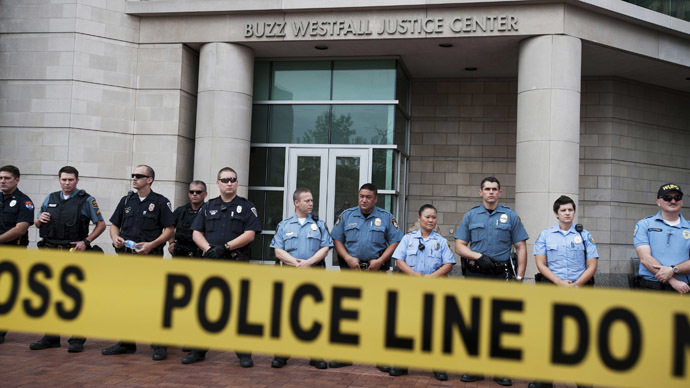The failure of the St. Louis County grand jury to hand down an indictment against the officer who fatally shot unarmed teenager Michael Brown caused uproar and protest, but law enforcement experts say that indictments against police officers are rare.
The perceived lack of indictment of police by grand juries could be due to multiple reasons, including a Supreme Court decision in a case involving orange juice, as well as the complex relationships between police departments and district attorneys.
There have been close to 1,000 people killed by police since January 1, 2014, and over 1,750 since May 2013, according to the website FiveThirtyEight.
READ MORE:Ferguson grand jury reaches decision
Against those figures is data from the FBI Crime Reports – based on police departments' own records – which say that of the 533,895 police officers hired to protect and serve 247 million Americans, 27 officers died in 2013 in the line of duty. In 26 cases, those deaths were caused by males. Fifteen of the men were white, 11 were black, and all had criminal records.
Missing from official records, though, is how many police officers were indicted for excessive force. An independent study in 2010 by researcher David Packman showed 4,841 reports of police misconduct involving 6,613 police officers. Of those misconduct complaints, 3,238 resulted in charges being made, but only 33 percent were convicted and 12 percent incarcerated.
Ohio grand jury: No indictments in John Crawford Walmart shooting. http://t.co/wvXZ1ZJ6dEpic.twitter.com/XiBKLXkzbK
— N.O.T.O.R.I.O.U.S.™ (@MrMilitantNegro) September 25, 2014
The low number of convictions and incarcerations result in part from a 1989 Supreme Court case involving a diabetic man’s erratic behavior during a trip to a convenience store for orange juice. He needed the beverage to bring up his low blood sugar, but the trip led to a confrontation with police officers, which left him with injuries from head to foot.
READ MORE:NYPD officers indicted for assault on teenager, knocking teeth out with gun
In Graham v. Connor, Chief Justice William Rehnquist wrote in his opinion: “The 'reasonableness' of a particular use of force must be judged from the perspective of a reasonable officer on the scene, rather than with the 20/20 vision of hindsight."
Rehnquist’s ruling that police can make such determinations quickly took on added significance in the Brown case, particularly since the situation leading up to his death unfolded in approximately 90 seconds. Those skeptical of Rehnquist’s judgment question just how far the justice system should defer to a police officer’s judgment.
@dallas_da We need a dialogue to expose the corruptions with Grand Jury Indictments & Police officers with abuse! pic.twitter.com/a4hQWHDciw
— Victoria CuqroMartin (@v_martin639) August 19, 2014
Community activists involved in efforts to curb police brutality often state that there isn’t a fair judicial process because the district attorneys usually have close relationships with police departments, making a fair trial impossible. Such points were echoed during the Brown family press conference in Dellwood, near Ferguson, on Tuesday morning.
"We saw how completely unfair this process was. We object properly and loudly on behalf of Michael Brown and his family that this process is broken. The process should be indicted," Brown family attorney Benjamin Crump told reporters.
"It should be indicted because the continuous, systematic results that is yielded by this process,” Crump added. “And let's be very honest about this process. We have the local prosecutor who has a symbiotic relationship with the local police, and the local police officers who sit in judgment whether to indict the police when they brutalize or kill a young person from our community, and normally that prosecutor has no relationship or no regards for the young person of color.”
READ MORE:Ohio cops killed Walmart air gun-wielding man moments after confrontation, new video shows
Criminal defense and civil rights attorney Ron Kuby told the Latin Post that the only way for police to be held accountable for crimes they commit against the citizenry is through “an independent statewide prosecutor for police misconduct...that’s the only way you will get police accountability, because local district attorneys are locally elected, they frequently rely on many of the same police officers who are investigating other police officers, and they are very reluctant as a rule to second guess the police involving line of duty killings. Sometimes they won’t even present the case to a grand jury.”

